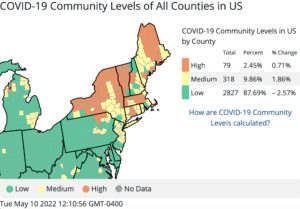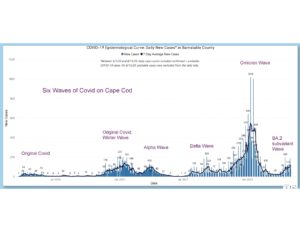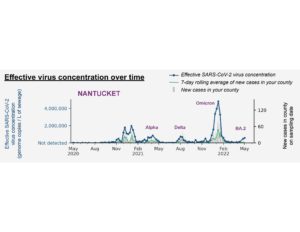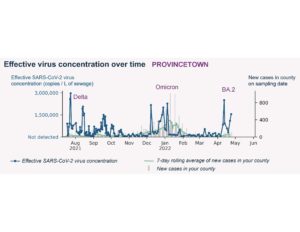PROVINCETOWN — The subvariants of Covid-19 that are currently prevalent in the Northeast — Omicron BA.2 and Omicron BA.2.12.1 — may not have their own Greek letters, but this scientific slight doesn’t seem to be slowing them down.
Barnstable County case data, wastewater data from Provincetown, Nantucket, and Boston, and the CDC’s “Covid Community Level” formula all show that Cape Cod is in a sixth wave of the pandemic. The infection rates are roughly comparable to the Alpha and Delta waves of last spring and summer.

Fortunately, these indicators still show levels far below the massive Omicron wave of December 2021 and January 2022, when case rates and other indicators soared 5 to 15 times higher than in all previous waves.
Every wave is different, and this one has been defined partly by the widespread adoption of at-home testing, and partly by the presence of therapeutics such as Paxlovid — a short course of antiviral pills. It is prescribed to especially vulnerable people early in the course of the infection and can help keep people out of the hospital. It must be delivered within five days of the onset of symptoms to be effective.
Testing Goes Private
Testing at public locations, such as the sites sponsored by Barnstable County and the three Outer Cape Health Services clinics, has declined. The total supervised testing number for Provincetown residents for the month of April — 389 tests — is the lowest since June 2021.
Eastham recorded 310 supervised tests in April. There were fewer than 200 supervised tests of Wellfleet residents, and fewer than 170 supervised tests of Truro residents.
These numbers come not from the state’s Covid dashboard, which includes only PCR testing, but from a more obscure state source called the Chapter 93 Daily Report. That report aggregates both kinds of testing — molecular PCR tests and supervised rapid tests, such as those performed at OCHS Provincetown and OCHS Wellfleet — into a single spreadsheet that is updated every weekday.

Supervised testing has decreased because at-home rapid test kits are now widely available. OCHS gives them away at medical appointments, and they are available for free at all Outer Cape town halls. In Provincetown, they are at the walk-up window in the town hall basement; in Wellfleet, people are advised to call ahead to make an appointment to pick up test kits.
Free test kits can also be ordered from the federal government by mail at covidtests.gov.
At-home testing was a key solution during the Omicron wave in December and January, when case numbers outpaced all prior Covid waves and governmental resources were stretched thin. At-home testing spared medical workers and county employees from having to supervise every test.
The widespread use of at-home tests, however, means public testing data is now catching only a fraction of all cases. And it’s hard to guess what that fraction is.
Even so, the formal case count still shows Barnstable County in a Covid wave. The graphs maintained by the Barnstable County Health Dept. show a county-wide rise in cases similar to the Alpha and Delta waves, with a county-wide positivity rate of 7 percent.
Wastewater Testing
With at-home testing accounting for an unknown number of cases, other data sources become an important way to keep tabs on the surge.
Wastewater testing in Boston, Provincetown, and Nantucket all suggest that the current wave is similar in scale to Alpha and Delta, but not nearly as bad as the winter Omicron wave.
Boston has wastewater data going all the way back to March 2020. The Deer Island treatment plant serves Boston and 42 nearby towns, totaling almost 3,000,000 people. Covid tests there are currently averaging about a half-million copies of the virus per liter of wastewater. That’s a bit above the level during the Alpha and Delta waves, but only about a 20th of the peak readings during Omicron.

Nantucket’s Surfside wastewater facility is also returning numbers very similar to the island’s Alpha and Delta readings, and about a tenth of the island’s Omicron peak.
There are only 1,100 properties on Provincetown’s sewer system, which is probably why the wastewater data in Provincetown is so much “noisier” than in Nantucket or Boston, with many ups and downs in the readings that don’t directly correlate to case counts among residents. But Provincetown’s wastewater data from last month is similar to the Omicron wave, and only slightly lower than the numbers during Delta.
On Friday, May 6, the CDC designated Barnstable and several other Mass. counties as having a “High Covid-19 Community Level.” The agency’s system is complex, involving a comparison of hospitalization levels to overall case rates. Most of New England is now at the CDC’s High Community Level; so is upstate New York, while most of the rest of the country is currently at a “Low Community Level.”
Paxlovid
Key pieces of Covid-related legislation have started expiring, but OCHS communications director Gerry Desautels confirmed that Covid testing, vaccines, and booster shots are still free at the health centers regardless of insurance status. CVS also has a large supply of free booster shots, with same-day appointments available in Provincetown and Orleans at cvs.com.
Paxlovid, an important new therapeutic that was approved for emergency use in December, is also free regardless of insurance status, Desautels said.
“We have prescribed and dispensed nearly 100 courses of the medication since it became available in January,” said Desautels. People who test positive at home can call their provider at OCHS and a telehealth visit can determine if the medication is warranted.

The Mass. Dept. of Public Health has also just rolled out a website where people can set up free telehealth appointments, upload a photo of their rapid test results, speak to a doctor in one of four languages, and find out if they should take Paxlovid. If the medicine is indicated, it is delivered to the patient’s home for free the next day, or it can be picked up at a pharmacy. That website is mass.gov/info-details/free-telehealth-for-covid-19-treatment-with-paxlovid.
Paxlovid contains a powerful “pharmacokinetic boosting agent” called ritonavir, which can create “significant and complex drug interactions,” according to the National Institutes of Health.
Partly for this reason, Paxlovid is approved only for people who are thought to be at “high risk of progressing to severe disease,” a list that includes older adults, cancer patients, and people with various chronic diseases. “Treatment should be initiated as soon as possible, and within five days of symptom onset,” according to NIH guidelines.
Paxlovid is the newest variable in this sixth covid wave, but it’s important that people know when and how to get it, because BA.2 and other Omicron variants can still kill people.
Barnstable County recorded eight deaths from Covid in April, according to the county health dept. That is fewer than Alpha, which killed 17 people in April 2021, or Delta, which killed 18 people last September.
Paxlovid is “widely available,” according to the county health dept. — but for its lifesaving potential to be realized, people need to know to reach out for it as soon as they fall ill.
